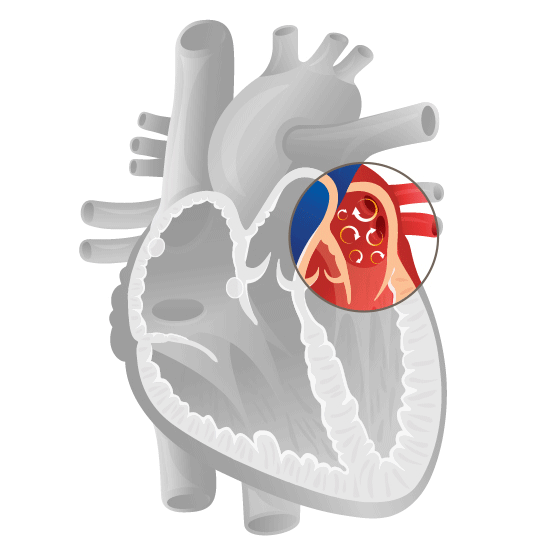Atrial fibrillation is the name given to cardiac arrhythmia where the atria beat irregularly and out of sync with the ventricles. It involves a disturbance of what is commonly referred to as normal sinus rhythm.
The electrical impulse that stimulates the heartbeat is generated by the sinus node in the right atrium. This impulse is then transmitted in an orderly sequence from the atria to the ventricles. Atrial fibrillation occurs when this orderly sequence is disturbed. Electrical impulses are sent out from other parts of the atrium, leading to atrial fibrillation or atrial flutter. Atrial fibrillation means that the atria beat faster than the ventricles.
This disease mainly affects the elderly and manifests as dizziness, irregular heartbeat and rapid pulse. Sometimes, however, those affected do not notice any symptoms.
Atrial fibrillation can occur suddenly and stop spontaneously, but it may also persist indefinitely. Although this arrhythmia does not pose an acute danger to the heart, it does increase the risk of stroke considerably, as the irregular pumping of blood may lead to the formation of blood clots. Over time, the impaired pumping action may also weaken the heart.
Atrial fibrillation should therefore always be clarified and treated. Those affected often take blood-thinning agents to reduce the risk of stroke.
Various treatment options are available to restore normal rhythm between the atria and ventricles. Drugs that slow the heartbeat or combat the arrhythmia are one option. However, sustained improvement can often be achieved with electrophysiological procedures such as electroconversion or catheter ablation. Certain forms of atrial fibrillation can be treated surgically.
Find out more about the treatment options such as electroconversion, catheter ablation or heart appendage surgery in the chapter entitled Procedures to treat cardiac arrhythmia.
Why choose Hirslanden
The specialists at Hirslanden, the largest private hospital group in Switzerland, are renowned for their expertise and many years of experience in treating your illness.
You can expect comfortable rooms and a modern infrastructure as well as the highest standards in medicine and care.
We will help you throughout your entire stay, organising additional services such as translators and interpreters, transport, and overnight hotel stays for you and your relatives, and addressing all your administrative questions.
A personal contact from the Hirslanden International team will take care of your needs from the time that you first contact us to arrange an appointment through to the end of your treatment.
Contact us – we are happy to help you!


